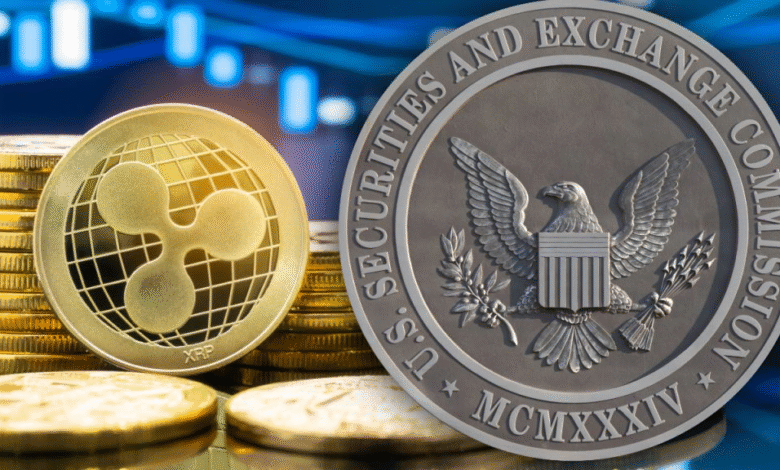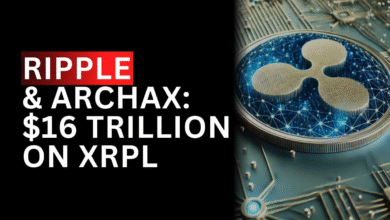Ripple SEC Settlement: Judge Torres on XRP Resolution

The **Ripple SEC Settlement** has become a pivotal moment in the ongoing saga of the XRP case, as Ripple Labs and the U.S. Securities and Exchange Commission (SEC) jointly appeal to Judge Torres for a swift resolution. This settlement not only aims to significantly reduce penalties but also seeks to solidify prior court rulings, addressing lingering concerns within the realm of crypto legal issues. As both parties collaborate, they emphasize the importance of this agreement in redefining the regulatory landscape surrounding XRP. With Judge Torres at the helm, the implications of this development extend far beyond Ripple, impacting how SEC regulations may shape the future of digital assets. Industry observers are eager to see if this settlement can truly streamline ongoing litigation and provide clarity for XRP and other cryptocurrencies.
In the intricate landscape of cryptocurrency regulation, the recent agreement between Ripple Labs and the SEC signifies a turning point in the long-established XRP dispute. By seeking judicial approval from Judge Torres, both entities aim to mitigate ongoing legal challenges and set a precedent for similar cases in the industry. The potential implications of resolving this matter extend to ensuring fair treatment under the law, as Ripple navigates complex regulatory frameworks. As discussions heat up around digital assets and their classifications, this settlement could serve as a foundational case amid evolving regulatory standards. The ripple effect of this decision may not only impact Ripple but could also influence future approaches to crypto legal issues across the board.
Understanding the Ripple SEC Settlement
The Ripple SEC settlement represents a significant turning point in the protracted legal battle surrounding the sale of XRP. Ripple Labs’ legal strategy has focused on securing reduced penalties and clearing up regulatory uncertainty that has long plagued the crypto market. By petitioning Judge Torres to approve this agreement, Ripple aims not only to conclude the litigation but also to set a precedent that could reshape how digital assets are regulated moving forward. This case highlights the necessity of defining ‘security’ in the context of cryptocurrencies, a point that has been at the heart of ongoing debates about SEC regulations and compliance.
In the proposed settlement, Ripple emphasizes that there is no intent to challenge the court’s earlier rulings made by Judge Torres. Instead, the focus is on creating a framework that allows for both compliance with existing regulations and a more favorable environment for innovation within the crypto industry. With the SEC signalling a shift in its approach to digital assets, the outcome of this case could provide clear guidance that not only benefits Ripple but also offers much-needed clarity for other industry participants navigating similar legal hurdles.
Judge Torres and the Ripple Case Developments
Judge Analisa Torres has been pivotal in the Ripple case, overseeing the proceedings as both parties seek a resolution that respects the legal norms while addressing the ambiguity in crypto regulations. The judge’s decisions have set critical precedents, particularly about the classification of cryptocurrencies as securities. As the settlement proposal unfolds, it reinforces the notion that regulatory clarity is essential not just for Ripple but for the entire digital asset market. The implications of her rulings extend beyond Ripple Labs and can influence how similar cases are handled in the future, especially regarding the definition of securities under U.S. law.
The interactions between Judge Torres and the Ripple legal teams reflect ongoing legal issues that numerous crypto entities face in dealing with SEC mandates. By encouraging stakeholders to engage directly with regulatory bodies, Judge Torres emphasizes a collaborative approach to navigating these challenges. Therefore, the developments in this case could signal a shift in how future lawsuits involving cryptocurrencies might be managed, pointing towards a need for clearer legal frameworks in an increasingly complex digital economy.
Ripple’s Efforts in Addressing Regulatory Compliance
Ripple Labs has proactively worked to ensure its compliance with SEC regulations throughout this lengthy litigation. The company acknowledges the evolving landscape of cryptocurrency regulation in the U.S. and has shown willingness to adapt its business practices to align with expected legal standards. This proactive engagement with regulators not only serves to mitigate future legal risks for Ripple but also establishes it as a cooperative player in the digital asset space, seeking to contribute to the development of fair regulations that support innovation.
The filings from Ripple’s legal team emphasize the notion that innovation should not be stifled by regulatory uncertainties. By engaging with SEC officials and participating in discussions about regulatory frameworks for digital assets, Ripple positions itself at the forefront of crypto compliance. The potential resolution of the XRP case could serve as a model for other companies navigating similar issues, highlighting the importance of addressing regulatory concerns while balancing the need for market evolution.
Implications of the Ripple Settlement on Cryptocurrency Regulation
The Ripple SEC settlement not only resolves a contentious legal dispute but also has broader implications for the regulatory framework surrounding cryptocurrencies in the U.S. The outcome could lead to a clearer understanding of how digital assets are treated under securities law, potentially impacting other ongoing cases within the crypto landscape. As Ripple Labs aims for reduced penalties, this may demonstrate to other companies that proactive compliance and engagement with regulators can lead to more favorable outcomes.
The ramifications extend beyond Ripple’s direct gains; a favorable settlement could encourage other cryptocurrency firms to pursue similar negotiation strategies with the SEC. This outcome could also signal to regulators the importance of establishing a clear and consistent approach to digital asset classification, thereby reducing uncertainty and risk within the market. As regulatory bodies like the SEC increasingly focus on refining their guidelines, the Ripple case may be remembered as a turning point that prompted more dialogue and collaboration between cryptocurrency businesses and regulators.
Current Trends in SEC Regulations and Cryptocurrency
In light of the Ripple case and others like it, there has been a noticeable shift in SEC regulations concerning cryptocurrencies. The establishment of task forces focused on digital assets indicates that regulators are realizing the need for tailored guidelines that recognize the unique nature of cryptocurrencies. With Ripple’s case spotlighting the need for clear rules, there is potential for the SEC to redefine its approach to this rapidly evolving market.
Recent discussions around SEC regulations suggest a move towards creating a more structured environment for crypto businesses. The SEC’s acknowledgments regarding their regulatory approach reflect an understanding of the community’s concerns and the complexities of digital asset transactions. This changing landscape serves as a backdrop for the Ripple SEC settlement, reinforcing the idea that effective regulation requires input from industry participants alongside legal interpretations.
Addressing Industry Concerns Through the Ripple Settlement
The Ripple SEC settlement seeks to address the concerns not only of Ripple Labs but of the broader cryptocurrency industry as well. By striving for a resolution that mitigates penalties, the settlement aims to reassure investors and market participants that fair practices can coexist with necessary regulatory oversight. Such an outcome echoes the sentiments of many who believe that the SEC’s approach to digital assets should evolve in a way that supports innovation while ensuring compliance.
Ripple’s efforts to settle this protracted legal battle indicate a commitment to maintaining its position in the crypto market. This move reflects a larger industry desire for clarity and consistency in regulatory frameworks, which is pivotal for fostering long-term growth. By resolving outstanding disputes, the ripple settlement could pave the way for a revised relationship between cryptocurrency companies and regulators, aimed at building a more robust and acceptable future for digital assets.
Judicial Economy and the Ripple Settlement
The notion of judicial economy plays a critical role in The Ripple SEC settlement as it attempts to streamline the legal process surrounding the XRP case. By acknowledging the settlement and its implications, the courts can conserve valuable resources while still honoring the legal precedents established by Judge Torres. This approach to judicial efficiency is fundamental in not only resolving the Ripple case swiftly but also in setting a favorable example for future litigations in the crypto space.
Efficiency in judicial proceedings is essential, especially in cases as complex as those involving cryptocurrency. Ripple’s joint motion with the SEC to finalize a settlement seeks to balance the need for accountability with the practicalities of court resources. A swift resolution would alleviate undue pressure on both district and appellate courts, allowing them to focus on other pressing matters within the burgeoning landscape of crypto-related legal issues.
The Legal Landscape for XRP and Ripple Labs
The legal landscape for XRP and Ripple Labs remains complex yet promising with the recent developments in their case against the SEC. As both parties work towards a settlement, the ongoing discussions highlight critical legal questions regarding the status of XRP as a security. The determination of this classification is not only pivotal for Ripple but will likely impact many other companies operating within the crypto landscape and their compliance with SEC regulations.
With each court ruling and regulatory change, XRP’s status evolves, influencing investor perception and market performance. The resolution of the Ripple case could lead to significant shifts in how cryptocurrencies are regulated, making it essential for stakeholders to stay informed and engaged. The broader implications of this case will set important precedents for future digital asset cases, showcasing the importance of aligning legal frameworks with technological advancements.
Future Prospects for Ripple Amid SEC Negotiations
As Ripple navigates through negotiations with the SEC, the future prospects for the company are closely tied to the outcomes of these discussions. A successful settlement would not only bolster Ripple’s position within the market but could also enhance investor confidence in XRP’s legitimacy as a tradeable asset. With increasing focus on compliance and regulation, Ripple’s proactive approach could set a standard for other companies seeking to ensure they meet regulatory expectations while pursuing growth.
The ongoing SEC negotiations signify a turning point for Ripple, positioning the company to potentially reclaim market trust and accelerate the development of its products and services. As the industry shifts towards clearer regulations, Ripple’s experience could be instructive for other crypto firms facing similar challenges. The resolution of the XRP case may ultimately foster an environment where innovation and regulatory compliance coexist, benefiting both the market and consumers.
Frequently Asked Questions
What is the current status of the Ripple SEC settlement regarding the XRP case?
As of June 2023, Ripple Labs and the SEC have formally petitioned Judge Torres to approve a joint motion that aims to end the long-standing XRP case. The motion seeks reduced financial penalties and clarifies that previous judicial rulings about XRP remain valid, regardless of the outcome.
How will the Ripple SEC settlement affect future SEC regulations on cryptocurrencies?
The Ripple SEC settlement could set a precedent for future SEC regulations concerning cryptocurrencies like XRP. Ripple emphasizes that the settlement supports the SEC’s recent efforts to establish clearer regulations for digital assets, which may influence how the SEC approaches similar cases in the future.
What implications does Judge Torres’ ruling have on Ripple Labs following the SEC settlement?
Judge Torres’ anticipated ruling on the Ripple SEC settlement will not alter previous judgments affecting Ripple Labs regarding XRP’s status as a security. The company remains accountable under existing securities laws, even with the proposed settlement easing financial liabilities.
Why did Ripple and the SEC agree to a settlement in the XRP case?
Ripple and the SEC reached an agreement to settle the XRP case in order to reduce penalties, mitigate appellate risks, and expedite a resolution. This settlement aims to conserve judicial resources while ensuring Ripple complies with securities regulations.
What role does the SEC play in overseeing Ripple Labs and XRP after the settlement?
Even after the Ripple SEC settlement, the SEC will continue to regulate Ripple Labs and its operations concerning XRP. Ripple’s case underscores the SEC’s commitment to enforce compliance with securities laws for all digital assets, maintaining oversight on their trading and issuing practices.
How does the Ripple SEC settlement impact the broader crypto legal issues?
The Ripple SEC settlement has significant ramifications for broader crypto legal issues as it could guide how regulators approach digital asset litigation. The outcome may help shape future enforcement actions and establish clearer guidelines for other cryptocurrency projects seeking compliance with SEC regulations.
What are the expected outcomes from the Ripple settlement with the SEC?
The expected outcomes from the Ripple SEC settlement include reduced penalties for Ripple, clarity on XRP’s legal standing, and a pathway for other cryptocurrencies to follow in achieving compliance with the evolving SEC regulations.
Can Ripple Labs be exempt from securities laws under the SEC settlement?
No, Ripple Labs will not be exempt from securities laws even if the SEC settlement is approved. The joint motion clarifies that Ripple must continue to adhere to applicable securities regulations, ensuring accountability within the cryptocurrency market.
What can we expect from Judge Torres regarding the XRP case resolution?
Judge Torres is expected to review the joint motion from Ripple and the SEC, focusing on approving the proposed settlement. If accepted, this could lead to a resolution of the XRP case and provide clearer guidance for future SEC actions concerning cryptocurrencies.
How has the SEC’s approach to digital assets changed recently in relation to the Ripple case?
The SEC has recently indicated a shift in its approach to digital assets, as highlighted in the Ripple case settlement discussions. The establishment of a crypto task force suggests a more tailored regulatory strategy, which Ripple supports and hopes will pave the way for clearer rules for the industry.
| Key Points |
|---|
| Ripple and SEC have submitted a joint motion to Judge Torres to end the XRP case with a settlement. |
| The filing aims for reduced penalties and to maintain previous court rulings as they pertain to XRP. |
| There is no request to revise the previous Summary Judgment Order from the court regarding XRP. |
| Ripple emphasizes its commitment to regulations, irrespective of any settlement agreement reached. |
| The settlement aims to resolve litigation and conserve judicial resources while ensuring compliance. |
| Ripple supports the SEC’s initiative to create clearer guidelines for digital assets and has participated in discussions. |
| The joint motion aims to alleviate court burdens and align Ripple with other entities who have settled earlier. |
| Both parties have requested a pause in ongoing appeals while the district court reviews their updated proposal. |
Summary
The Ripple SEC settlement represents a pivotal moment in the ongoing legal saga of XRP, where both Ripple and the SEC are advocating for the court to approve their joint motion. This settlement not only aims to streamline the resolution of the case but also seeks to redefine regulatory frameworks around cryptocurrencies like XRP, potentially alleviating ongoing judicial burdens and ensuring compliance with securities laws. As the SEC continues to adapt its approach to digital assets, this resolution could pave the way for clearer regulations in the cryptocurrency industry.




